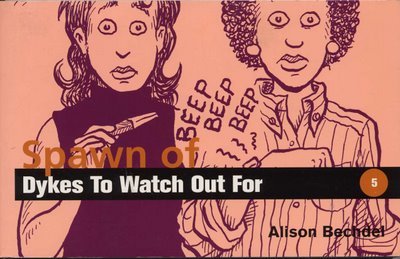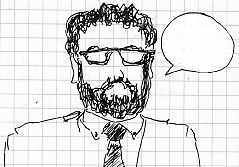Monday, June 05, 2006
Alison Bechdel

Alison Bechdel is a masterful cartoonist who has been producing her award-winning strip Dykes to Watch Out For since 1983. (The image is the cover to the fifth collection of strips, published in 1993 by Firebrand Books.)
Her insightful, well-wrought, and literate graphic memoir Fun Home: A Family Tragicomic, (Houghton Mifflin), has just been published, and I can't recommended it highly enough. I just finished reading the book over the weekend, and plan to post more about it once I've spent some more time with it and have given it additional thought.
Margot Harrison's recent article ("Life Drawing") from Seven Days: Vermont's Alternative Webweekly, provides an interesting exploration of Bechdel's creative career, as well as an assessment of the memoir.
The Comics Journal has a 2001 Bechdel interview, conducted by Trina Robbins, available online, and while it provides ample evidence that Bechdel is engaging and funny, (two things readers of her strip already know), we also learn that Fun Home was developing in her mind for quite some time.
Robbins: Let's start by having you tell us what you're working on now.
Bechdel: Well, I'm always working on my comic strip and trying to, you know, keep cranking that out. I've been trying to sort of make that my day job, which has been a huge struggle because...
...
I'm trying to make time in my life to work on a graphic memoir. Although, at the rate I'm going, it'll take forever to finish.
...
[T]here was something else going on for me as a kid, something about my gender identity that I haven't figured out yet. And that's one of the things I'm hoping to dissect and investigate in this memoir project.
But mostly, it's a book about my relationship with my father. Writing this book feels like a completely different activity from writing my comic strip because it's about real life. I feel like I'm using a part of my brain that's been dormant until now.
And here's Bechdel describing work that has inspired her:
Bechdel: I never really read superhero stuff as a kid. I'm pretty illiterate when it comes to comics history. Some Little Nemo, some Krazy Kat, that's it.This is one lesson Bechdel's learned well; the way her writing and drawing complement one another is part of what makes reading her comics such a treat.
Robbins: Oh, wow, yeah. So what's your inspiration then? You couldn't have just sprung from an oyster shell or something.
Bechdel: Mostly it was Mad magazine. And I did read a lot of -- I had a subscription when I was little, but I also had access to some old collections, the little paperbacks of the really good stuff.
Robbins: Yes. Mad. They were the best. I also see Jules Feiffer in your work.
Bechdel: I love Jules Feiffer. I didn't discover him until I was a little older. But I read comic books. I read things like Richie Rich and Little Lulu. I had a big box of classic comics up in the attic that my dad got from an antique show. But I don't feel like the comic books, the Richie Rich and Little Lulu stuff really shaped my work in a substantive way, except to maybe teach me basic visual grammar. The satiric ethos of Mad was a much bigger childhood influence. That and Charles Addams. I discovered his stuff before I could read, and was mesmerized by it. It was so frustrating because I thought I'd be able to understand these cartoons when I learned to read the captions, but they were still a complete mystery. I'd look at them for hours, trying to figure out what the joke was. I think I learned my biggest cartooning lesson from Addams -- how to calibrate that crucial, tantalizing distance between the image and the words. Not too wide, not too narrow - just enough for the reader to complete the circuit.
